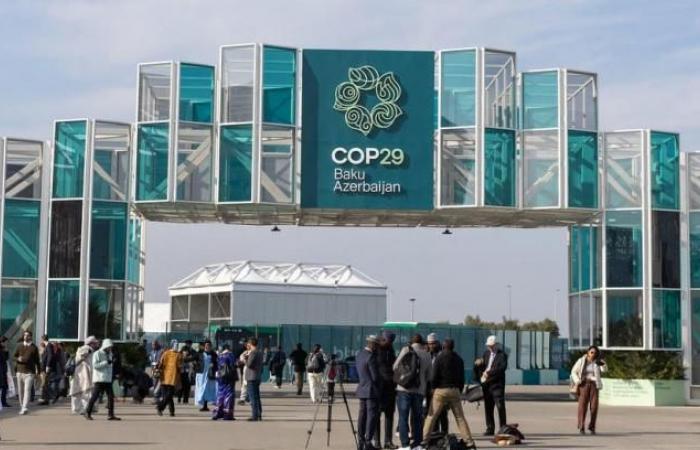Diplomatic efforts for climate action moved south on Tuesday, as G20 leaders meeting in Rio sent a clear signal to negotiating teams at the UN climate talks in Baku on the need for rapidly and substantially increase climate finance.
While the declaration from the world’s major economies – and the biggest emitters of greenhouse gases – did not explicitly refer to the “transition away from fossil fuels”, on which all nations agreed last year at COP28 in Dubai, G20 leaders “welcomed the balanced and ambitious outcome” of these discussions.
The G20 communiqué was released as time runs out on COP29, which is scheduled to end this Friday in the Azerbaijani capital, Baku. Complex negotiations on new and significantly increased funding for loss and damage and accelerated clean energy targets are moving slowly, as some countries stick to their positions while waiting for others to reverse theirs.
UN Climate chief Simon Stiell, who previously warned against brinkmanship and what he called “you first”, said on Tuesday that G20 leaders had sent a message clear to their negotiators at COP29: “A successful new financial objective… is in the obvious interest of each country. »
“Leaders of the world’s largest economies are also committed to advancing financial reforms to put strong climate action within reach of all countries,” said Mr. Stiell, who is the Executive Secretary of the Framework Convention. of Climate Change (UNFCCC), which organizes the annual COP meetings.
“This is a critical signal in a world gripped by debt crises and escalating climate impacts, which are destroying lives, disrupting supply chains and fueling inflation in all economies,” he said. he added.
“Failure is not an option”
UN Secretary-General António Guterres, who is in Rio to participate in discussions on sustainable development, the fight against poverty and hunger, as well as climate change, noted during a session Tuesday morning that Brazil is preparing to host COP30 next year in the Amazon region.
“The failure [à Bakou] is not an option. This could undermine ambition in the preparation of new national climate action plans, with potentially devastating impacts as irreversible tipping points draw closer. The preservation of the Amazon is an example,” he said.
The Secretary-General said that missing the opportunity to agree on a new climate finance deal in Baku “would inevitably make the success of COP30 in Brazil more difficult”, adding: “I appeal to a sense of responsibility of all countries around this table to help ensure that COP29 will be a success.”
Some climate and environmental activists in Baku said they were cautiously optimistic about the G20 communiqué, while others gave it a mixed verdict, saying the statement was vague on climate finance and did not did not explicitly mention the need to move away from fossil fuels.
Harjeet Singh, climate activist and director of global engagement for the Fossil Fuel Non-Proliferation Treaty Initiative, shared his views with UN News: “Developed countries remain impassive, fail to quantify the trillions necessary or to ensure that these funds are provided in the form of grants – essential to achieving climate justice.”
“Their reiterated rhetoric offers no comfort in the tense COP29 negotiations, where we continue to see an impasse on climate finance,” he added.
Agri-food solutions
Alongside the negotiations, dozens of meetings and events are underway at COP29, with the bulk of Tuesday’s activities focused on agriculture, food security and water. Delegations from around the world shared their experiences on sustainable food production practices and addressed challenges related to agriculture.
Just in time for COP29, new analysis from the Food and Agriculture Organization of the United Nations (FAO) found that almost all countries identify agri-food systems as a priority for adaptation to climate change ( 94%) and mitigation (91%) in their nationally determined contributions (NDCs).
According to FAO, this highlights the enormous potential of agri-food systems as climate solutions, particularly as countries prepare to submit their third round of NDCs in 2025.
“Agri-food systems are essential to ensuring food security and hold the solutions to multiple challenges: climate change, biodiversity, land degradation and water scarcity” because climate change is an important factor in food insecurity in a world where around 730 million people still suffer from hunger, said FAO Assistant Director-General Viorel Gutu.
“Unfortunately, current funding and investments are not enough to bring about the transformation we need,” he stressed. He added that over the past two decades, financing for agri-food systems has declined from 37% to 23% of all climate-related development finance.
Agriculture certainly contributes to greenhouse gas emissions, but if it is well managed, it can also help overcome the crisis.
Support women
Jemimah Njuki, Head of Economic Empowerment and Head of the Economic Division at UN Women, also highlighted the importance of agriculture for climate action and broader sustainable development efforts.
In an interview with UN News, she called on governments to provide special support to farms run by women.
“Without women, we will not be able to feed the world,” stressed Ms. Njuki. At the same time, she lamented that women are less likely than men to own the land they farm and that it is more difficult for them to obtain loans to expand their businesses.
It is not only women who are affected, but also other vulnerable groups, such as indigenous peoples.
Andrea Echiverri, of the Global Forest Coalition, an international non-governmental organization that advocates for social and gender justice in rural communities, said she believed current agricultural practices were destructive to the environment.
“Take the example of livestock farming, which requires more and more pastures, which means that forests continue to be cut down and indigenous peoples are forced off their lands,” Ms. Echiverri said.
Governments, she stressed, are not paying enough attention to the sustainability of livestock, although the industry is responsible for around 16% of all greenhouse gas emissions and 15% of all fossil fuels consumed.






